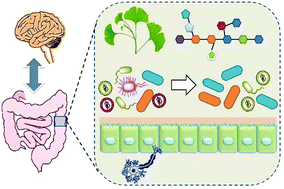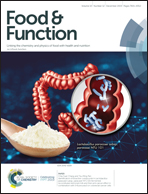One water-soluble polysaccharide from Ginkgo biloba leaves with antidepressant activities via modulation of the gut microbiome†
Abstract
Depression, a mental illness characterized by persistent feeling of sadness and loss of interest, has been a serious health problem worldwide. Manipulation of the microbiota by probiotics and prebiotics represents a novel emerging strategy for the treatment of various psychiatric disorders such as major depressive disorders. Here, we show that one water-soluble polysaccharide from Ginkgo biloba leaves (GPS) reduced stress-induced depression and reversed gut dysbiosis. Similar to the antidepressant paroxetine, GPS significantly reduced the immobility times in the tail suspension test (TST) and forced swimming test (FST) and anxiety-like behavior in the open field test (OFT). Consistent with the improvement of depression-like behavior above, GPS mice had elevated serotonin and dopamine levels in multiple brain regions including the hippocampus, cerebral cortex and olfactory bulb, relative to unpredictable chronic mild stress (UCMS) treatment mice. GPS treatment could alleviate the stress-induced reduction in the density of serotonin-positive and dopamine-positive cells. Fecal microbiome transplant (FMT) combined with antibiotic treatment showed that the anti-depressant activity of GPS had a causal relationship with intestinal microbes. By performing a pyrosequencing-based analysis of bacterial 16S rRNA (V3 + V4 region) in fecal of the mice, the results showed that GPS reversed depression-associated gut dysbiosis and increased the richness of Lactobacillus species which has been proven to be a path to relieve depression. Our results demonstrated that the polysaccharide from Ginkgo biloba leaves might be a promising pharmacotherapeutic candidate for treating depression.



 Please wait while we load your content...
Please wait while we load your content...